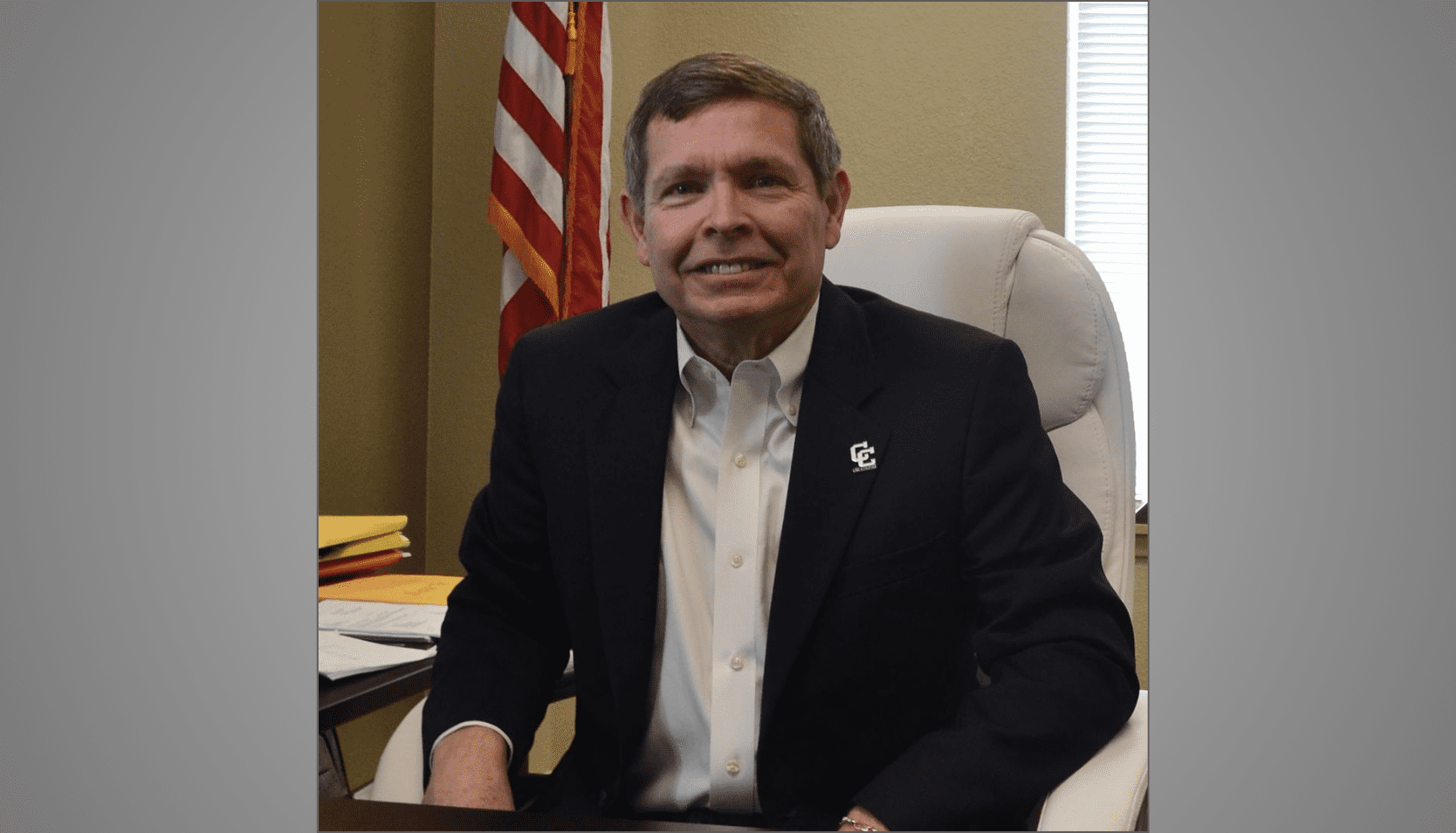Multiple bureaucrats at the state and local levels are paid very well, despite scandals and incompetence.
To put it bluntly, there are two Texases: one for those in government and one for citizens.
At the 2004 Democrat National Convention, disgraced vice presidential nominee John Edwards gave his “two Americas” speech. He said there’s “one for all of those people who have lived the American dream and don’t have to worry, and another for most Americans, everybody else who struggles to make ends meet every single day.” He also spoke of the nation having two economies: “one for people who are set for life, they know their kids and their grandkids are going to be just fine; and then one for most Americans, people who live paycheck to paycheck.”
Edwards was attempting to play the class warfare card, dividing citizens against themselves. While he may have been correct about there being a divide, he was incorrect about the two sides. While Edwards was class warfare-baiting, research suggests he might as well have contrasted private citizens and those in government.
According to the U.S. Social Security Department, the “’raw’ average wage” of Americans in 2021 was $58,129.99. Meanwhile, the average salary in 2021 of the top 100 employees in the federal government was $409,276.04. The highest earner was the National Institutes of Health’s controversial Dr. Anthony Fauci.
It is clear this is a divide where the taxpayers are funding high-on-the-hog lifestyles of those who are supposed to be public servants. But not only are there “two Americas,” there are also two Texases.
Economist Vance Ginn of Vance Ginn Economic Consulting told Texas Scorecard the median household income in Texas is $67,404. The city manager of Dallas in 2022 was paid $410,000. For context, the average annual wages of the top 5 percent in the world in 2020 was $342,987. When adjusted for inflation for the year 2023, that would equal $403,041.63.
“There’s no doubt that an elite few are getting rich off the taxpayer teat,” said James Quintero of the Texas Public Policy Foundation.
Meanwhile, millions of American citizens are being hammered. Just look at the inflation caused by the massive spending and overprinting of money by the federal government. “Inflation has had a major effect on Texans, really all Americans,” Ginn told Texas Scorecard. “What we’ve seen is that last year, inflation was reaching a peak of about 9 percent, which is the highest in a generation.” Since then, the rate has gone down to 4 percent year over year through May 2023. Ginn believes that, outside the last couple of years, “that’s still the highest rate of inflation” since 1981.
Inflation may seem like an abstract idea, but it’s a hard reality when it hikes your costs of living. Ginn pointed out that food prices continue to go up by about 8 percent year over year. “Gas prices are averaging across the state more than $3 a gallon,” he continued.
It also “reduces the inflation-adjusted returns from investments,” Ginn stated. This includes individual retirements. While hard-working Texans are left to deal with such ravages on their own, state lawmakers raced to have these same taxpayers save their retirement pensions in the 2023 legislative session.
Tim Hardin, CEO of Texans for Fiscal Responsibility, said that lawmakers “gave themselves a perpetual inflation adjusted adjustment”—meaning that from now on, it will automatically update based on inflation.
“They did this so they never have to go through and do it again and embarrass themselves like they did this session.” State lawmakers helped bureaucrats too. “They did this to tons and tons of agencies,” Hardin continued. “But taxpayers are ultimately going to have to pay for this.”
Hardin explained how this exposes the divide of the two Texases. While lawmakers raced to save their own skins, Gov. Greg Abbott has had to call multiple special sessions in order to make any progress on giving homeowners property tax relief. “They will adjust their pensions, they will adjust bureaucrat salaries, they will adjust agencies for inflation. But taxpayers don’t get that same respect.”
During the regular session of 2023, lawmakers also prioritized reviving and rebranding a corrupt corporate welfare scheme. It had expired at the end of 2022.
In this two-part investigative series, Texas Scorecard will examine the pay of the version of Texas in which bureaucrats and local governments live well on the burdens of struggling taxpayers. Part 1 examines state agencies and local governments, while Part 2 will focus exclusively on education.
Source Documents
For this article, Texas Scorecard reviewed records obtained from multiple state and local governments.
These records include the 2016 and 2022 salaries for top staff at the Texas Department of Family and Protective Services (DFPS), Texas Department of Health and Human Services (HHSC), Texas Medical Board (TMB), and Texas Department of Insurance (TDI).
We reviewed organizational charts for HHSC (2018-2022) and TMB (2016 and 2022).
We also obtained the 2016 and 2022 salaries of top officials of Travis County, Dallas County (Files A and B), Tarrant County, Harris County (from their Human Resources & Risk Management office), and Bexar County (Files A and B).
The cities of Dallas (2022 and City Manager T.C. Broadnax’s contract), Fort Worth (offer letter to City Manager David Cooke, and 2016 hourly rates for top staff), Houston (2016 and 2022), El Paso, and Colleyville (city manager’s 2015 and 2022 pay) also provided salary records.
This article contains highlights from these documents. Citizens wishing to conduct a deep dive should click the links above. Unfortunately, the records from El Paso were sent in a special file that cannot be uploaded.
State Agencies
A myth that has penetrated the national psyche is that Texas is a land of radical self-governance. The reality is far from that. Evidence to that effect includes multiple scandal-plagued or tyrannical state bureaucratic agencies.
In two investigative series launched in November 2022 and March 2023, Texas Scorecard examined the Texas Department of Family and Protective Services, the parent agency of Child Protective Services (CPS).
It is an agency that illegally took a 4-year-old child from his parents in 2019. It is one whose bureaucrats led a deep state rebellion against public servants’ attempts to protect kids from gender mutilation procedures. It is an agency that appears to have internal conflict in its leadership, engages in shoddy investigative work, and reportedly has defied state law.
Yet one can get paid well in such a scandal-plagued and rebellious bureaucracy. In 2016, former DFPS Commissioners John Specia and Henry Whitman were paid more than $230,523 and $220,000, respectively. This went up in 2022. Controversial Commissioner Jaime Masters was paid $235,500. Gov. Greg Abbott fired Masters in November 2022.
Another agency reportedly caught doing shoddy investigative work is the Texas Health and Human Services Commission (HHSC). Both HHSC and DFPS were reprimanded in a bombshell Texas Senate December 2022 report for how poorly they investigated The Refuge, a shelter for sex slavery victims. This work resulted in the temporary shutting down of the shelter. Col. Steven McGraw, head of the Texas Department of Public Safety, found that to be unnecessary after a thorough investigation.
For this, taxpayers have paid agency leadership well.
In 2016, HHSC Executive Commissioner Charles Smith’s salary was more than $266,000. In 2022, Executive Commissioner Cecile Young’s salary was more than $290,000.
There are significant ties between HHSC and DFPS. The current DFPS Commissioner, Stephanie Muth, in 2016 was a deputy director at HHSC, with a salary of close to $190,000. In 2018 she was listed on the HHSC organizational chart as state Medicaid director, Medicaid & CHIP Services. She eventually started a consulting firm before being hired as Masters’ replacement.
There’s another connection between the agencies. In 2016, Jennifer Simms of DFPS was transferred to the Department of State Health Services (DSHS), which is under HHSC. At DFPS, in 2016, her salary was more than $145,000. After the transfer, her DSHS salary was more than $175,000 as a deputy director. That’s roughly a 17 percent pay hike.
HHSC, like all government bureaucracies, tends towards growth regardless of the burden on taxpayers. Their organizational charts from February 2018, compared with March 2022, shows that the number of leadership positions increased from 34 to 45.
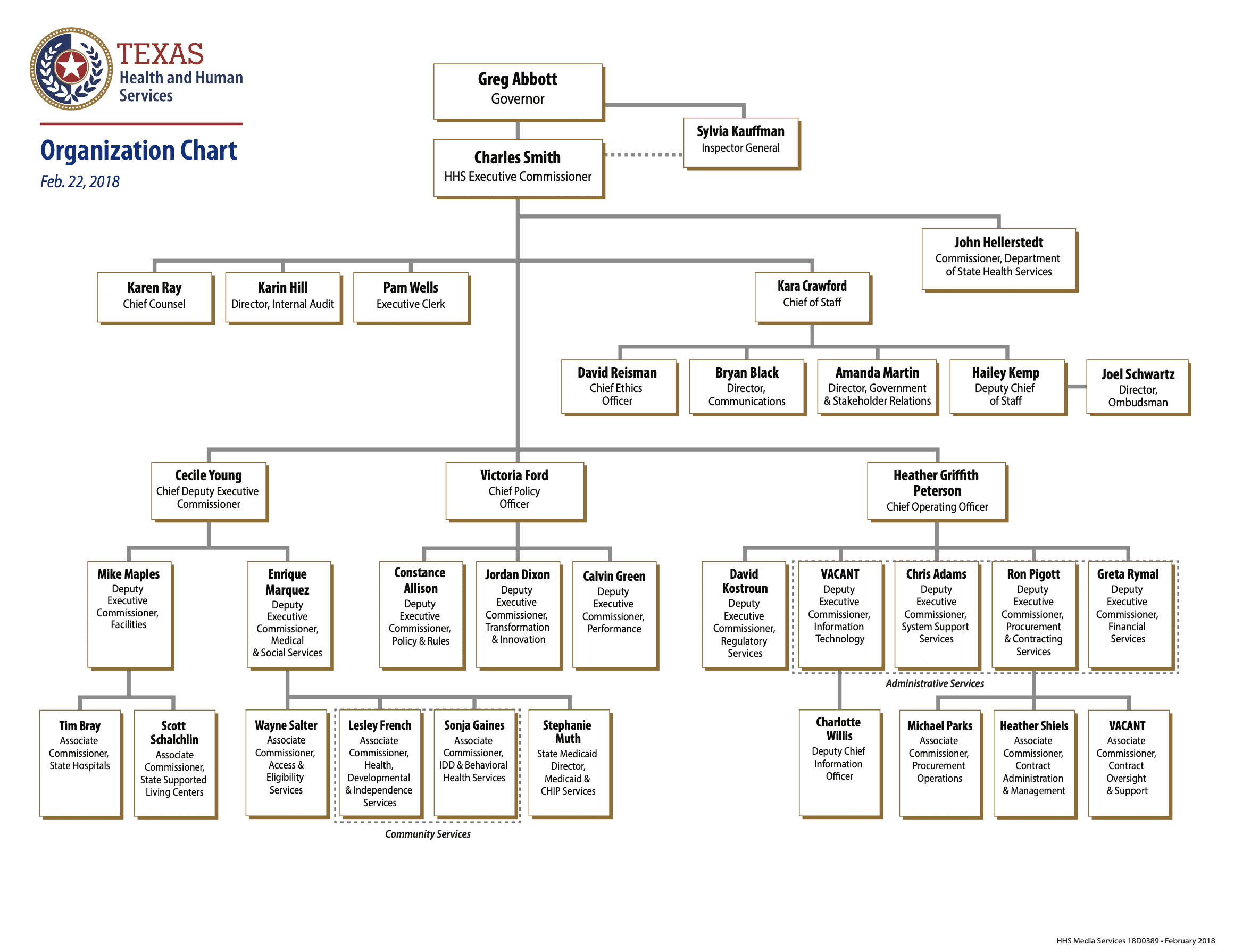
Source: Texas Health and Human Services
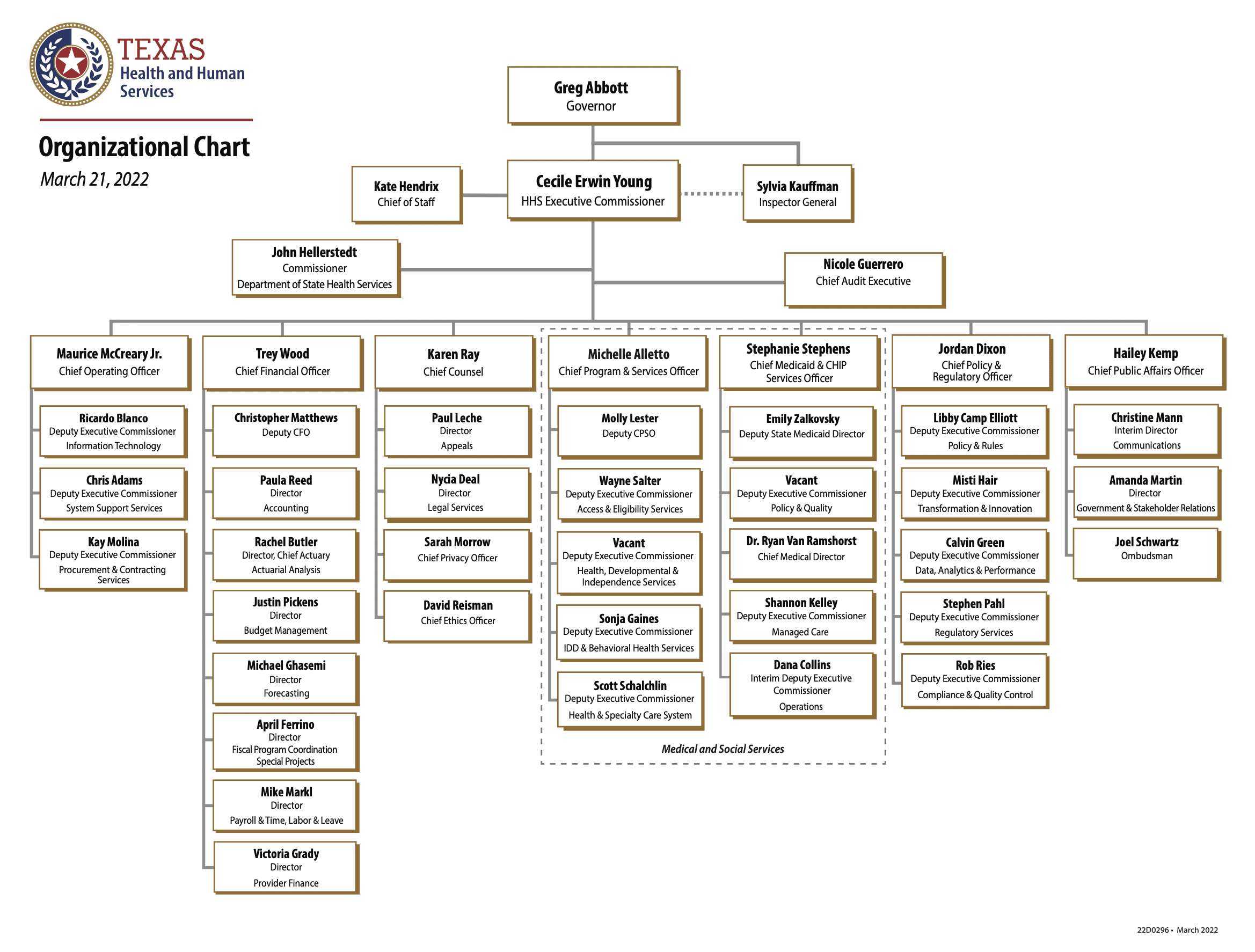
Source: Texas Health and Human Services
Bigger bureaucracies are not better for citizens. A Newsweek 1977 publication by economist Milton Friedman pointed to a study of the British National Health Service by a Dr. Max Gammon. Gammon found that in “a bureaucratic system … increase in expenditure will be matched by fall in production … Such systems will act rather like ‘black holes,’ in the economic universe, simultaneously sucking in resources, and shrinking in terms of ‘emitted’ production.”
One peculiar position is that of director of Government & Stakeholder Relations. Typically, the term “stakeholder,” when used by public servants, indicates special interests advocating for objectives typically against citizens. In 2016, Kelly Kennedy Garcia was employed in this position for a salary of nearly $150,000. In 2022, Jonathan Connors was in this post at a salary of $160,000—a more than 7 percent increase.
Then there is the infamous Texas Medical Board (TMB). As previously reported by Texas Scorecard, Dr. Eric Hensen, a Texas ear, nose, and throat doctor in Palestine, was targeted by them for not enforcing Gov. Greg Abbott’s mask mandate in 2020. TMB penalized Dr. Hensen with a “remediation plan” that involved a $500 fine, continuing medical education, a jurisprudence test, and other additional requirements that Hensen could not maintain. In March 2023, TMB suspended his license. In April, after public pressure and exposure, TMB reversed course.
While they attacked Dr. Hensen’s ability to make a living, life is pretty good for those at TMB with their taxpayer-funded salaries. In 2022, their executive director was paid more than $156,000, up from 2016’s $145,930.20. The salary for their investigations manager went from $87,500.04 in 2016 to more than $92,000 in 2022. Their Licensing manager was paid $86,300.04 in 2016 and $92,000.16 in 2022. Their Litigations manager was paid $104,949.72 in 2016, and close to $115,000 in 2022.
“[The] State’s Total Compensation Package includes 35.3% benefits (indirect compensation) and 64.7% salary,” Ryan Wimmer of TMB’s Open Records Division wrote to Texas Scorecard.
A comparison of their 2016 and 2022 organizational charts reveal a growing bureaucratic beast here too.
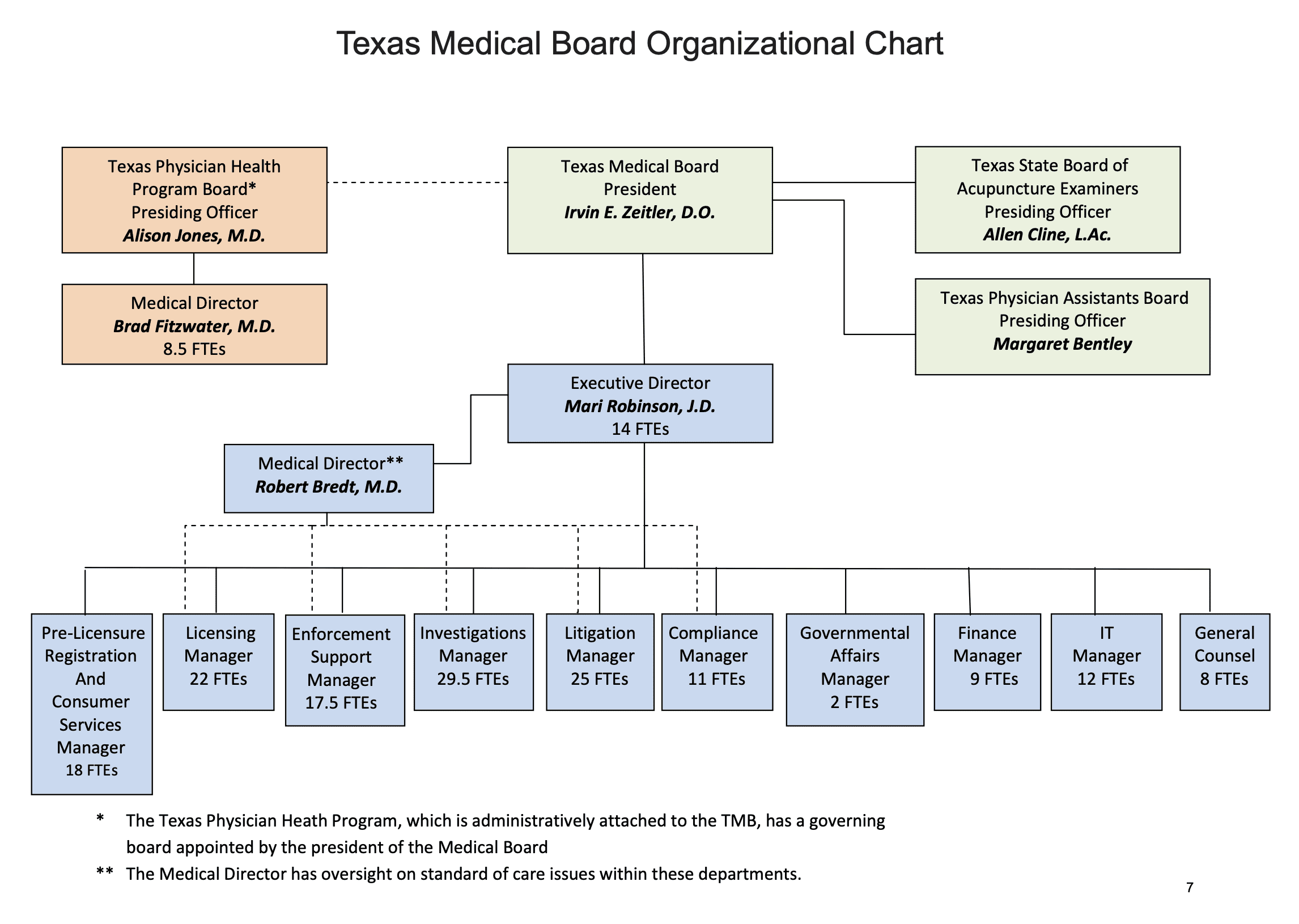
Source: Texas Medical Board
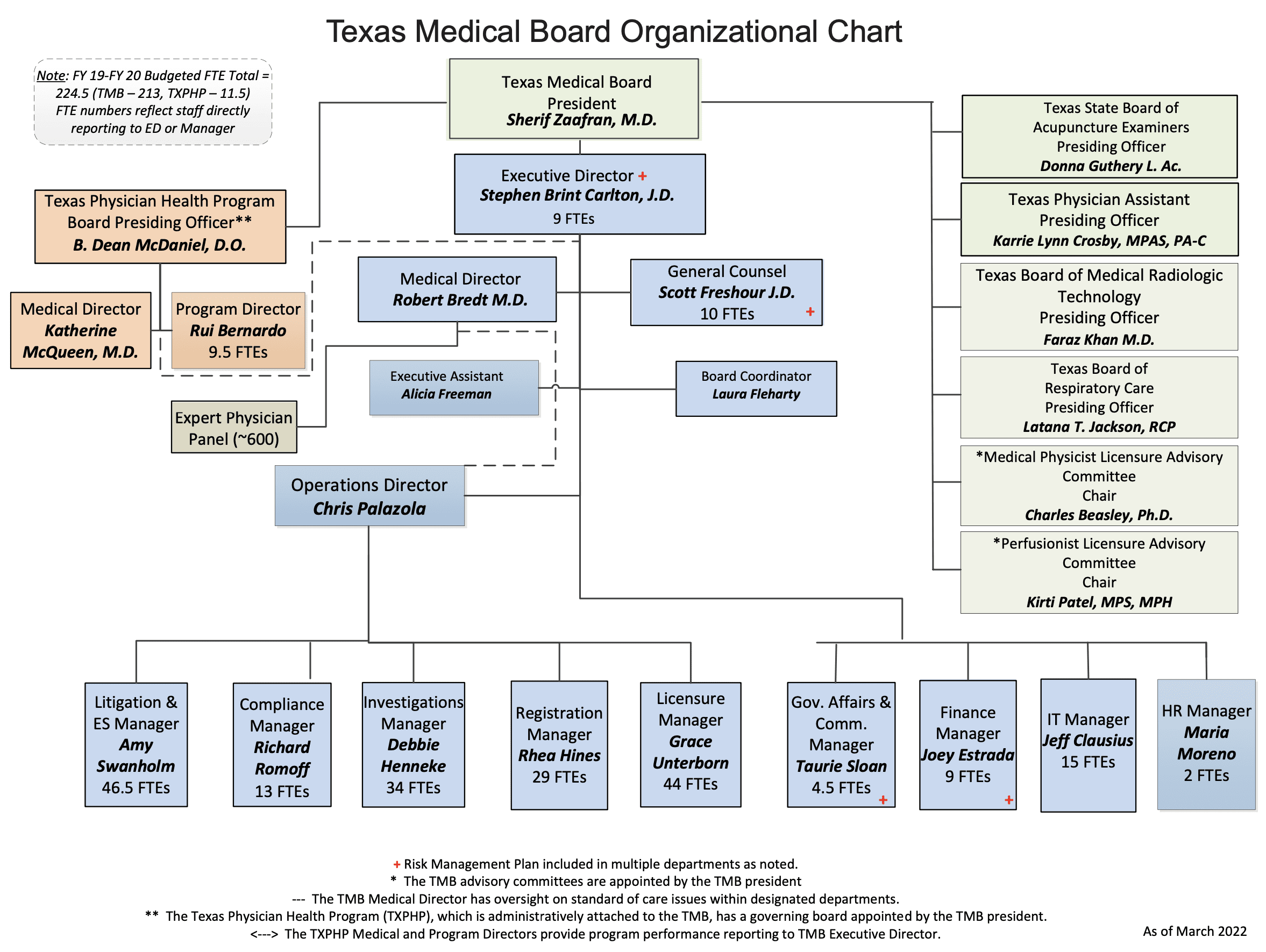
Source: Texas Medical Board
2016 shows a total of 17 leadership positions. 2022, on the other hand, shows 25, with an “Expert Physician Panel” of roughly 600 individuals.
Texas Scorecard sent an open records request to TMB for information on the members of this panel and records of any and all financial compensation they receive. “Information and material related to an investigation of a license holder is confidential,” replied TMB’s Ryan Wimmer. He pointed to a 2007 Texas Attorney General Ruling. Texas Scorecard asked if this meant that a member, or all members, of this panel were under investigation. “The pre-determination letter and statement regarding investigations were included so you would understand why some portions of your request were withheld,” Wimmer replied.
There are also government agencies most citizens aren’t even aware exist. Such as the Texas Department of Insurance. This agency “regulates the state’s insurance industry, oversees the administration of the Texas workers’ compensation system, performs the duties of the State Fire Marshal’s Office, and provides administrative support to the Office of Injured Employee Counsel – a separate agency.”
Taxpayers are funding some quite lucrative salaries at this little-known bureaucracy. TDI’s 2016 Commissioner was David Mattax. He was paid more than $202,000. In 2022, TDI Commissioner Cassandra Brown’s pay was more than $217,000. Mattax had two chiefs of staff—one who left in March ($150,000) and the other who joined in April ($143,000.04). Nancy Clark, Brown’s chief of staff, was paid $180,000 in 2022.
TDI has grown as well. In 2016, Mattax had 11 Deputy Commissioners with a combined salary of more than $1.5 million. Contrast that with Brown’s 16 deputy commissioners in 2022 and their combined salaries of close to $2.6 million. That is a 70 percent increase in just six short years.
After the Texas Legislature passed the biggest spending increase in state history, with Gov. Greg Abbott’s approval, more government growth is on the way.
But growth and good pay aren’t limited to state agencies. They are also found in local governments.
Counties
Holes continue to be poked in the Democrat narrative that theirs is a party of the people. From 2016 to 2022, taxpayer-funded salaries in multiple Democrat-controlled county governments exploded. However, we did find some exceptions.
First, there’s Democrat-dominated Travis County, where the state capitol of Austin lies. Records from the county show elected public servants there have given themselves generous raises over the course of 2016 to 2022. Precinct 3 Travis County Commissioner Ann Howard’s salary shot up more than 57 percent from her 2016 predecessor Gerald Daughtery ($93,000 to more than $146,000). The next highest increase was Precinct 2 Commissioner Mary Shea, whose 2022 salary was 49 percent higher than it was in 2016 ($98,463.00 to $146,720.00). The rest of the commissioners gave themselves increases of more than 41 percent.
Travis County Judge Andrew Brown’s shot up more than 35 percent from his predecessor, current State Sen. Sarah Eckhardt (D–Austin). Tax Assessor-Collector Bruce Elfant has also experienced a tidy 21 percent increase.
While not as outrageous, 2016 and 2022 records show that elected public servants in Dallas County also hiked their pay. Democrat Commissioners Theresa Daniel and John Wiley Price gave themselves a more than 20 percent reward over that time period. Taxpayers now cut them a more than $175,000 salary compared with their 2016 pay. Over that same course of time, County Judge Clay Jenkins (D) gave himself a 15 percent pay increase, rising to more than $175,000. Even former Commissioner J.J. Koch (R) hiked his pay 12 percent, up to more than $163,000.
Jenkins became infamous in 2020 for his attempts at near dictatorial rule during the Chinese coronavirus, affecting lives and livelihoods while his taxpayer-funded salary remained unaffected. He also supported Black Lives Matter activists who promoted the idea of defunding the police.
Only Commissioner Elba Garcia (D) has kept her pay unchanged since 2016. It remained at more than $126,000. She told Texas Scorecard this was because that’s what she promised the voters. “For 11 years I never accepted a salary increase or a car allowance.”
Republicans don’t appear to be immune to greed, either.

Left, former Tarrant County Judge Glen Whitley (R). Right, Dallas County Judge Clay Jenkins (D)
Tarrant County records report that from 2016 to 2022, Commissioners Gary Fickes (R) and J.D. Johnson (R) gave themselves over that time period 20 percent raises, while County Judge Glen Whitley (R) gave himself a 19 percent raise. Roy Charles Brooks (D) gave himself 20 percent. “Twenty percent is about 4 percent per year. That’s about more than double what the average person would receive in Texas on an annual basis,” Economist Vance Ginn said. In 2022, Fickes, Johnson, and Brooks bilked from taxpayers a more than $201,000 salary each, while Whitley was paid more than $211,000.
County commissioners and Whitley also became infamous for near dictatorial rule during the Chinese coronavirus in 2020. Whitley went all the way to announcing a ban on in-person church services until a grassroots outcry forced him to recant his position. Johnson and Whitley were replaced by Commissioner Manny Ramirez (R) and County Judge Tim O’Hare (R) in 2023, following the 2022 election. Fickes has said he will not run for reelection.
Even bureaucrats have enjoyed living high on the hog. Dallas County Administrator Darryl Martin, who reports to the Dallas County Judge and commissioners, over the course of six years received a salary increase of 26 percent to more than $276,000 (2016 and 2022 records). His Tarrant County counterpart, the retiring G.K. Maenius, got a 41 percent increase during that same time frame. He was paid more than $393,000 in 2022. Taxpayers funded more help for him too. In 2016, Tarrant County had two assistant county administrators with a combined salary of more than $303,000. In 2022, that doubled to four assistant administrators, with salaries of more than $752,000 combined.
Surprisingly, records from corrupt Harris County show commissioners and county judges didn’t post big salary increases from 2016 to 2022, but they do have big salaries. Controversial County Judge Lina Hidalgo (D) gave herself an 8 percent increase to more than $190,000, all but one of the commissioners also gave themselves 8 percent raises to more than $182,000. Newcomer Commissioner Tom Ramsey’s (R) salary was already at that amount, which his predecessor Steven Radack (R) was being paid in 2016.
But Harris County’s payroll did go up. In 2016, they did not have a county administrator. They added that bureaucratic position and hired David Berry, and his salary in 2022 was more than $358,000.

Harris County has become a dumpster fire, with rampant crime and electoral issues. Hidalgo and all but one county commissioner (Republican Tom Ramsey) approved testing a new welfare program that gives $500 a month in federal taxpayer monies to 1,500 random citizens in multiple zip codes. As of last report, the 18-month test pilot program only targets those in the district of Democrat Commissioner Rodney Ellis. Texas Scorecard previously reported that Ellis is at the center of Harris County’s Spider Web of Power.
There was a county Texas Scorecard examined that seemed to show some fiscal restraint in so far as top level salaries are concerned. Democrat-controlled Bexar County’s County Manager had the same salary in 2022 as in 2016: more than $284,000. According to records from the county, it appears the county manager also serves as budget officer.
But the high salaries don’t end there.
Cities
The salary of the president of the United States, commander in chief of the U.S. military, is $408,000. Dallas City Council members voted to pay City Manager T.C. Broadnax more than $410,000 as of 2022. This is more than 9 percent higher than his pay in 2017. That was the year city council hired him.
This is the same city manager, under whose management Dallas has been besieged by multiple scandals, including a homeless problem, massive data loss at the police department, and a coverup regarding the controversial August 2021 arrest of Angela West—the wife of former Republican gubernatorial candidate Allen West.
Those under Broadnax are paid handsomely as well. According to their 2022 salary data, Broadnax’s three assistant city managers—Majed Al-Ghafry, Jon Fortune, and Jose Zapata—combined had a salary of more than $798,000.
Meanwhile, Dallas city council has repeatedly voted to hike homeowner’s tax bills from 2016 to 2019. They did so again in 2022 when they adopted a property tax rate above the no-new-revenue rate. That is the tax rate which, if adopted, keeps homeowners year to year tax bills more or less stable in the aggregate. City taxpayers also have a heavy debt load of $5.9 billion, according to Truth in Accounting. In their 2023 Financial State of the Cities Report, Dallas earned a “D” rating, and ranked 68 out of 75 cities they studied.
Broadnax’s salary is extremely high compared to other city managers Texas Scorecard examined. But that does not mean their pay is not exorbitant, as Quintero noted city managers “are earning tremendous amounts” of taxpayer monies. He pointed to the Texas City Management Association’s 2022-2023 salary survey. It only includes certain cities, and excludes many major municipalities, but still has rather shocking information. “You have at least two dozen city administrators who are earning more than $250,000, and some of these administrators are earning as much as $370,000,” Quintero said. He added that this information does not include “any of the generous benefits that cities provide to these elite public sector administrators.”
Neighboring Fort Worth did not provide as much transparency as Dallas in the course of our investigation. The salary information we were provided regarding City Manager David Cooke was the city’s 2014 offer letter of $315,000. They also provided his 2016 hourly rate of $151.44. Among the benefits promised to him was a membership to the establishment’s exclusive Fort Worth Club, with city taxpayers paying his monthly dues.

From top to bottom: Dallas, Fort Worth, El Paso
The last time city council members adopted a tax rate below the no-new-revenue rate was in September 2020. In the 2021 and 2022 votes since, both have been tax hikes. Truth in Accounting’s 2023 report pegged city taxpayer debt was at $1.8 billion. City council earned the city a “D” rating, and it ranked 53rd out of 75 cities studied.
While repeatedly hiking taxes, according to the establishment-backed Fort Worth Report, city government have repeatedly asked voters to hike the pay of city council and the mayor. Just as repeatedly, the voters have rejected this. The most recent no vote was in 2022, thus freezing their pay at $25,000 for city council members, and $29,000 for the mayor. Compared with the salary of Austin’s mayor and council—more than $97,000 and $83,000—and Dallas’ mayor and council members—$80,000 and $60,000—Fort Worth voters have kept their elected public servants pay closer to public service.
Farther down south, while citizens in Houston are dealing with crime-ridden streets, it’s good to be in city government. In fact, taxpayers have funded an explosion in payroll from 2016 to 2022. Texas Scorecard requested the city’s records of the salaries and benefits for multiple departments, top bureaucrats, the mayor, and city council members. In 2016, the grand total of these salaries was more than $2.3 million. In 2022, it exploded to more than $28 million.
Truth in Accounting found city taxpayer debt was at $6 billion. The city council earned Houston a “D” and a 57th ranking out of 75 cities studied.
Life is also good in El Paso, a Democrat-dominated city suffering from the invasion of illegal immigrants. While citizens there have to fear for their lives, records show their city manager got a more than 45 percent raise. In 2016, City Manager Tomas Gonzalez was paid $300,000. In 2022, his pay was more than $436,000.
Truth in Accounting found this city to be in better shape than its three sisters. Its taxpayer debt is at $386.6 million. City council earned a “C,” and the border municipality ranked 38th out of 75 cities studied.
It’s important to note when reviewing these salaries that local governments (counties, cities, school districts, and more) currently can tax your home. It’s a power they’ve abused with massive over-earning. “It’s to the point where people are being pushed out of their homes, and we’ve kind of been there for a while,” Hardin said.
“Taxpayers have every right to be frustrated with how much compensation local elected officials are receiving,” Quintero told Texas Scorecard. “We have a particularly bad affordability crisis in this state. One of the major factors that’s driving that crisis is over taxation. When you look at any government budget, the primary expense is on personnel.”
Quintero believes it’s time for state action. “I think the evidence suggests to me that local elected officials have gone overboard on the matter of compensation, and it’s time for the Texas Legislature to get involved and establish some reasonable boundaries that will restrain the appetite of local governments.”
This get-rich-by-government system has a domino effect that hits taxpayers.
“There are many people who take government jobs to enrich themselves, because the public sector now pays better than most of the private sector,” Hardin said. “It’s an unsustainable model, and eventually, we’re going to have to pay the piper for it.” Ginn cautioned that high salaries in government would cause a kind of “brain drain” from the private sector as well. “The higher wages, salaries [are] by these in government compared to the private sector, the more incentive there are for people to be to go into government and not be productive parts of an economy in the private sector.”
But there is one unique case in all of this.
A Different City Manager
There was another city examined in the course of our investigation: Colleyville. The city manager’s pay went up in this North Texas city, as well. Former city manager Jennifer Fadden’s March 2015 salary was more than $172,000. Current city manager Jerry Ducay’s salary in 2022 was more than $250,000.

Colleyville is unique in that their city council has not raised property taxes for five years. Council members have done this by repeatedly adopting the no-new-revenue rate. This was one of the objectives of the Colleyville revolution that started back in 2016. “It was about changing everything, and creating a citizen service based government that worked for its people and its taxpayers,” former Councilmember Chris Putnam told Texas Scorecard.
What existed before, with Fadden and the previous city council, was far from that. Putnam got involved after the city government in 2016 tried to extort money from him. It started when he was building a home in the rural part of the city. “The city informed me that I was going to have to build a sidewalk, and not just any sidewalk, the American Disabilities Act compliant sidewalk, on a street that had no sidewalks,” he said. This would cost $40,000. After a very public fight against this, Putnam said the city dropped the request for a sidewalk, and just asked for the money instead. “Ultimately, I paid $10,000 to not build a sidewalk. … It just felt so cold, like government theft.”
This was during the time of former City Manager Jennifer Fadden. Putnam didn’t take this lying down. He and others organized a citizens’ revolution. The city council and mayor were replaced by ones focused on being public servants.
Part of the cleanup started with city manager Fadden. “She was running the city as well as running a real estate business,” former Councilmember George Dodson told Texas Scorecard. He was part of the revolutionary council citizens hired. He recently left office due to term limits he helped put in place. “She took advantage of information—I don’t know how she got the information—of bankruptcies and buying houses in the Colleyville Center.” He explained that is a part of town where businesses and condos in the same building.
Reportedly Fadden was not good at her job. “She was running the city unbelievably inefficiently,” Dodson recalled. “In many cases, she had one director, one manager and one employee. She was paying the chief of police a double salary as chief of police and assistant city manager. She was paying people extra money.”
Current Mayor Bobby Lindamood was a bit more kind. “I think that she was thrust into that position because I believe that they were in a turnover period. … There’s a lot of things that she really didn’t know,” he told Texas Scorecard. “We found a lot of discrepancies that were done under her leadership, and a lot of employees that were way overpaid.”

Colleyville Mayor Bobby Lindamood
Dodson said she had come to Colleyville after previously working for the city of Weatherford, where Dodson said they had issues with her. “They ran her off because she was raising their electric rates and moving the money into the general fund.”
Reportedly, this was a practice she brought with her to Colleyville. “I found out the city was actually profiting millions of dollars a year off residents’ water bills,” Putnam recalled. After being elected to city council, when at the time he was outnumbered by the grow government establishment, they had sent him to the audit committee. That is where he discovered the water profiteering. “I just have this philosophical notion that basic utilities, like water and sewer, shouldn’t be profit centers. They should be delivered at the cost of that service.”
Dodson said when citizens sent more new members to city council to back up Putnam, they didn’t directly confront Fadden. Instead, they put a change to the city charter to the voters in November 2016. This change would require that the city manager and senior employees disclose any potential conflict of interest. Voters approved it, and Fadden retired not too long afterwards.
Thus started the Colleyville reforms. Shortly later, Jerry Ducay was hired as the new city manager.
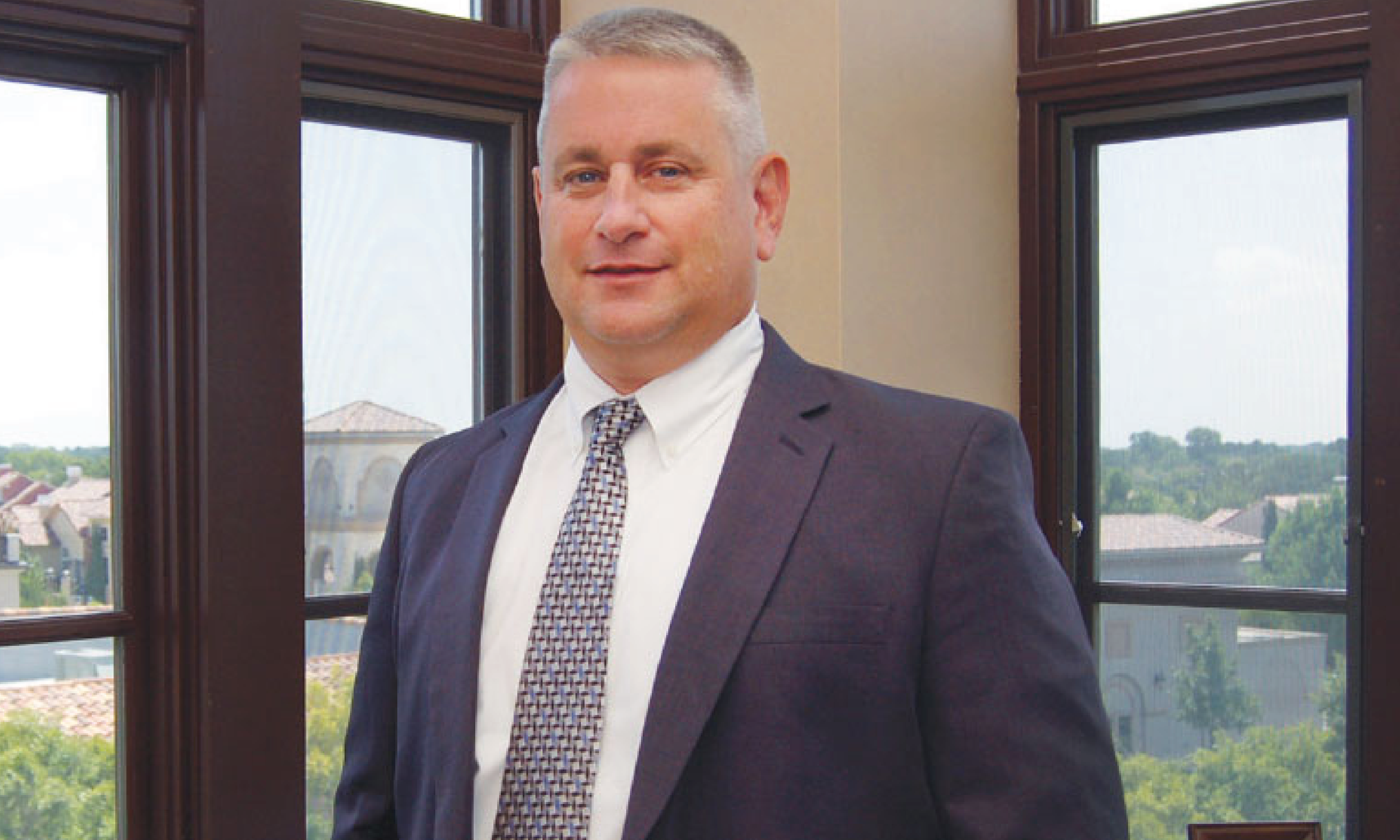
Colleyville City Manager Jerry Ducay
Texas Scorecard asked Lindamood how he could justify Ducay’s salary. “Unfortunately, the market is driving these positions to a higher rate to keep these great employees and city managers,” he replied. “Are we paying Jerry a high salary? Absolutely, we are. But are we keeping the best around? Absolutely, we are.”
Lindamood then gave a rundown of Ducay’s performance as justification. He credits him for helping Colleyville stop raising taxes. “He had helped us figure out how to dive in and to settle that rate to five years in a row as the no new revenue [rate], which brought our taxes to the lowest in the region.”
But Lindamood cautioned that the days of not hiking taxes may not continue this year. “We may not be able to lower it to the effective tax rate, we may have to take just a little bit,” he said. “That’s just because we bought the gym recently—we got a sweetheart deal on that—and then there was the compensation study that we had done for all the employees. Plus, our insurance, it went up dramatically, and that’s across the board of the state of Texas.”
Lindamood credits Ducay for bringing more transparency of how taxpayer monies are handled. “All of our funds, reports, and accountability for every dollar is online. He helped put that into place. It was his idea.” Lindamood also said Ducay helped them bring in more “frontline personnel” in police, fire, and public works, without hiking spending. Instead, Ducay “eliminated” nine and a half full-time jobs in management and administration, worth about $650,000, in order to bring on the additional help.
He found more ways to make the city government run efficiently. Colleyville used to have an economic director. Ducay eventually assigned one of the assistant city managers to handle that task, and others. “We have two assistant city managers, but they hold roles of about five different personnel. They’re super good,” Lindamood said. “Every six months, [Ducay] flips them. They go and do the other person’s stuff, so that he can train them how to run the complete city in full.”
Ducay also helped the city acquire more funds for city maintenance. He found these through county and state grants. “A lot of cities will not go and pursue this money,” Lindamood explained. “I think we’re up to this date, we have somewhere close to $28 million in grants since Jerry has been in office. And that doesn’t even include the Cares Act funding.”
For these and other efforts, Lindamood confidently supports Ducay’s pay. “We have the Tom Brady of city managers.”
Lindamood added he hears the outcry of overburdened taxpayers across the state and urges them to not keep quiet. “They need to start holding all the taxing entities accountable at school, city, county, colleges, hospitals, whatever it is. … That’s why I’m proud about Colleyville: We hold ourselves accountable.”
Conclusion
As Texans’ costs continue to explode, those they pay in government are living well. This is not a sustainable situation. “They’re keeping their jobs, they’re raising their own salaries at a much faster rate than the average Texan is getting across the state,” Ginn said. “This is going to be more of a drain on the Texas economy and, more importantly, on Texas families.”
Quintero said “the most obvious remedy” is for voters to notice and act. “But, again, the Legislature also has a responsibility to make sure that its political subdivisions are acting in a manner that’s in accordance with conservative expectations.”
Meanwhile, “70% of Americans report they are feeling financially stressed, with 58% living paycheck to paycheck,” said Congressman Ken Buck (R-CO).
In Part 2 of this series, Texas Scorecard will examine high salaries in the state’s education apparatus.
This article has been updated since publication.
No ads. No paywalls. No government grants. No corporate masters.
Just real news for real Texans.
Support Texas Scorecard to keep it that way!



